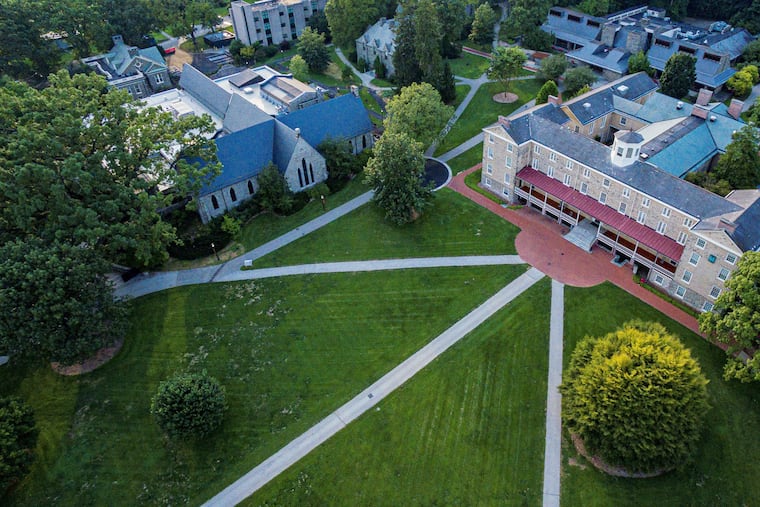Haverford students on strike after college officials’ comments on Walter Wallace Jr. death
Students said they were incensed that Haverford, which is supposed to care deeply about social justice, would try to interfere with their right to protest.

Concerns that Haverford College wasn’t doing enough to support its Black and brown students had been mounting, students say.
Then came the email last week from the president and dean, urging students not to participate in protests in Philadelphia after police shot and killed Walter Wallace Jr.
Students said they were incensed that Haverford, which is supposed to care deeply about social justice, would try to interfere with their right to stand up against injustice. Within hours, hundreds poured onto the college’s Founders Green in protest.
Now, some students are refusing to attend classes, do course work, or perform jobs at the college, and they said their strike — in its sixth day Tuesday — will continue until the college gives into their wide-ranging demands. The demands include removing the president as the chief equity and diversity officer‚ protecting and supporting students’ participation in protests, and treating equitably and providing more support and aid to first-generation students, students of color, and LGBTQ students.
The college appears to have met at least one demand; students called for Haverford to close on Election Day so that all students and employees could vote. Haverford canceled classes and made the day a paid holiday. But it was too little, too late for students, who say they have been serving on committees and calling on Haverford to do more for a long time.
» READ MORE: Fatal shooting of Walter Wallace Jr. prompts heated protests
“It was kind of a breaking point," sophomore Ayanna Madison said of the email from president Wendy Raymond and dean Joyce Bylander, “and a reminder that all the work we have been putting in has done absolutely nothing to change this institution and we have to do something that will.”
The concerns are emblematic of growing unrest on college campuses that have been inflamed by the deaths of more Black people at the hands of police and a pandemic that has worsened inequities. Students at the University of Pennsylvania last week also sharply criticized an email from campus leaders that talked about Wallace’s “death” but didn’t mention police. The city is preparing to release video of Wallace’s shooting on Wednesday.
In a statement, Haverford said: “The College supports our students in pursuit of both a truly just and equitable society as well as systemic change at Haverford." The college has responded to students and "welcomes the full community’s reflection while looking forward to doing the work associated with the process of reform.”
It’s unclear how many students are participating in the strike, but it also is impacting Bryn Mawr College, which has a close relationship with Haverford in which students at each campus can take classes at the other. Some Bryn Mawr students have joined in the strike in solidarity.
Student organizers estimate several hundred students — about 1,000 are living on campus — are involved and encouraging the rest to take part. Some faculty also have canceled classes in solidarity, including members of the anthropology department, said Madison, a psychology and linguistics major from Dayton, Ohio.
» READ MORE: How Haverford, Swarthmore, and other small college campuses hope to fend off the coronavirus
After George Floyd’s death at the hands of police in Minneapolis earlier this year, Raymond called on the campus to become “antiracist,” which now rings hollow to student strike organizers.
Last Wednesday, two days after Wallace’s shooting and as protests in Philadelphia continued, Raymond and Bylander wrote to the campus that another Black American “has met an untimely, violent death at the hands of police.”
They continued: “Now is not the time to go to Philadelphia. Our fear is that for every righteous protester in the street, there are other actors afoot; we have seen this across the nation far too often, in cities large and small, in college towns and urban centers. There are individuals who might seek to spin this moment out of control and cause harm and havoc.”
And participating won’t bring Wallace back, they wrote.
“I was just really upset,” said senior Soha Saghir, former cochair of Haverford’s honors council. "To not protest against police brutality doesn’t make sense,” especially when it happened a few miles from campus.
She would have liked to hear the college say: “If you want to stand up against this injustice, we are behind you.”
Raymond and Bylander followed with another email, emphasizing that they were not trying to suppress students' rights to protest but were concerned about their safety.
In a letter to students Tuesday, Raymond said she affirms their right to participate in protests as long as they follow health safety protocols, including COVID-19 testing. She also made some concessions in other areas.
But Madison said students found the response inadequate.
She doesn’t want to see Raymond removed as president, she said, just as chief equity officer.
“We don’t believe anything she has done was done with malicious intent,” Madison said. “We believe a lot of what she has done has been done in ignorance.”